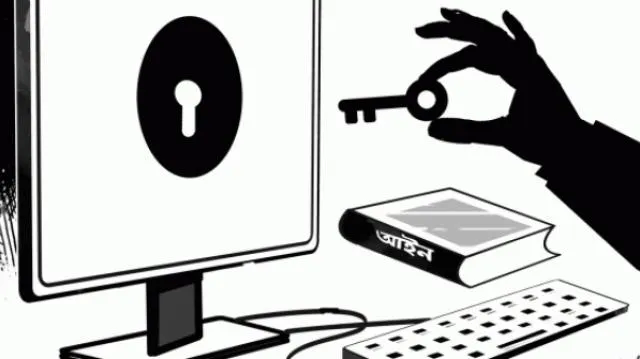Recently two journalists of Reuters have been sentenced to seven years in Myanmar. The government had alleged that they had disclosed state secret information by 'espionage'; And the convicted journalists say that through investigative journalism, they have actually 'done professional duties'. But ignoring the protest of the whole world, the Myanmar state's black law has identified those investigating journalists as 'espionage' and punished them.
As a journalist, we think that there will be innumerable incidents like Myanmar in Bangladesh using the newly passed Digital Security Act. Why this fear? What we have forgotten, how many journalists and ordinary citizens have been harassed under Article 57 of the ICT Act! In the first six months of this year, there were 391 cases filed. Most of these cases are under section 57. In these cases 785 accused, 313 of whom were arrested. At this time 19 cases were filed against journalists under section 57. We have seen that a case has been filed against two teachers of Dhaka University by misusing the law; In the latest incident, Assistant Professor of Sociology Department of Chittagong University Maidul Islam is in jail in a leader's case.
Contrary to the fundamental rights of Article 57 of the ICT Act. In the face of strong condemnation and protests from the beginning, it has been said before the government that it was being canceled. But the fact is that the statement of this section is divided into different sections, and in different interpretations, the different types of digital security bills have been kept. Why is this fraud against the people?
It was repeatedly said that new legislation will be made in consultation with everyone and there will be amendment before the finalization. But he did not keep the promises; Digital Security Bill passed by ignoring journalists' objections. After the law was raised in the Parliament, it was noticed that there was no noticeable change. Even more difficult and widely discussed, controversial and condemned in a series like 'Digital Spying' - Article 32 has been covered.
It is understandable that journalists, rights activists, people of all walks of life are expressing concerns about the law and the rule of law, considering the process of implementation of the law and the important sections.
In section 32, if a person holds, transmits and preserves, or conducts, is assisted by a public, semi-government and autonomous organization, through digital or electronic data through illegal entry, the maximum punishment for 14 years; 25 lakhs fine.
Explanation, seizure and arrest without warrants of original contents of section 43 of the Digital Security Act. According to sub-section 1 of this Act, "If there is a reason for believing in any police officer, any crime is under or under any circumstance or there is a danger of losing, losing, removing, or becoming marginal in any other way. Or if you are afraid of it, then you can record the reasons for similar beliefs and perform the following tasks:

A) Inquiries and interception of entry in that place; according to the Criminal Procedure;
(B) seizure of any computer, computer system, computer network, information-data or other equipment and evidence of offense used in the conduct of the inspection at that place;
C) search the body of any person present there;
D) If any person present in this place has committed an offense under this Act or is suspected of doing so, then the person is arrested.
Apart from this, the provision of various penalties and penalties for hacking, destruction of computer source code, and illegal possession, transmission and preservation of government information.
Most of the new legislation is ineligible to bail. However, there is a provision of bail for the offenses of defamation of 20, 25 and 48 of 29 defamation cases. The Digital Security Agency will implement the law. And there will be a high-level Digital Security Council supervision. The Prime Minister will be the Chief
It is clear that the eyes of this section of the law are being blocked, the people and the organization are blocking the way of freedom of expression and free journalism. In view of this, the editorial council has objected to these six sections of 21, 25, 28, 1, 32 and 43 of the Act. They claim that the new law, especially these six clauses, contradicts the constitution and the Right to Information Act. Transparency International Bangladesh (TIB) has called for not passing the Digital Security Bill as a law against the fundamental principles of the constitution. The organization said that the concerns and opinions of the media workers on the various sections of the bill have been ignored, which would create risk for their independent professional responsibilities. In addition, the section will act as the main obstacle to conducting research journalism and any kind of research session.
We believe that the proposed law will serve as a barrier to the possibility of corruption in the government-sponsored digital Bangladesh and the possibility of ensuring good governance in the welfare of IT. Without a combination of opinions, disagreements and dissent, free democracy is not established. And when stroking democracy, it takes a form of autocracy, which is never good for a country.
We want to hope that obstacles in the way of people's freedom of expression and free journalism - the government will not make any such decision. Therefore, we are also hopeful that he will not sign the claim with the Committee to Protect Journalists (CPJ), others who have appealed to the Honorable President, he will not allow such a 'black law'